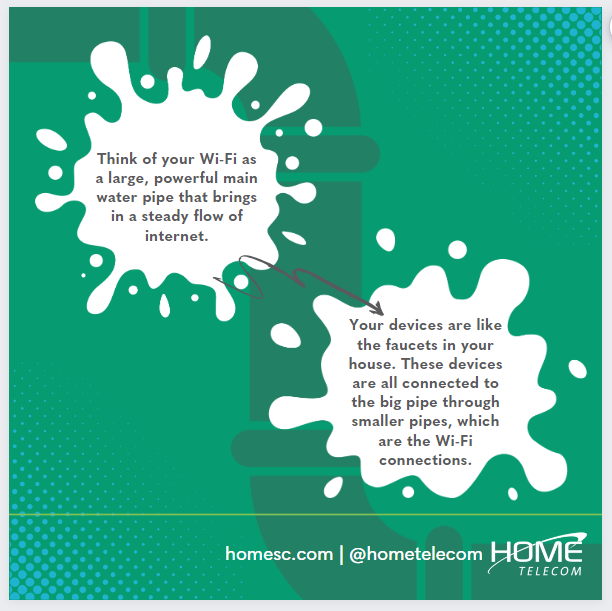
There’s nothing worse than trying to stream your favorite TV show and it repeatedly buffering. Or attending (even worse, leading) a conference call while working from home and seeing the screen frozen in time only to miss out on critical information. How frustrating!
It’s just like having a clogged water pipe that disrupts the flow and causes inconvenience. To better understand how your Wi-Fi works, think about your Wi-Fi as a water supply system in your home. Imagine it as a large, powerful main water pipe that brings in a steady flow of internet, delivering plenty of speed to all your devices simultaneously.
Now, consider each of your devices – your smartphones, tablets, laptops, smart TVs, and more – as the faucets in your house. These devices are all connected to the big pipe through smaller pipes, which are the Wi-Fi connections. Just like in a plumbing system, the size and condition of these pipes can influence the flow. Let's talk about the common factors that can "clog" up your internet pipe.
Network Overload
Think of network overload as too many faucets turned on at once. When multiple devices are connected to your Wi-Fi network and all demanding high amounts of bandwidth at the exact same time, your internet can slow down. If you have a family of gamers, or if everyone is streaming or video conferencing all at once, you might see this issue at home.
Solution: Opt for a higher-speed internet plan that can accommodate more devices at the same time. This will ensure that everyone can enjoy a smooth online experience without interruptions. Not sure what all devices are connected at the same time? Check your MyWiFi Xtreme app, and while you’re there– set priorities over which devices need first dibs on available speed!
Obstacles and Interference
Just like blockages in your pipes can restrict water flow, obstacles in your home can do the same thing to your Wi-Fi signals. Believe it or not, even some of the materials used to build your home can affect these signals. Walls, furniture, and even mirrors might be affecting the Wi-Fi signals in your home, leading to weaker connections and slower internet speeds.
Solution: Consider repositioning your router in a central location in your home. This can help reduce interference and ensure a more even distribution of Wi-Fi signals. If you have a larger home, consider contacting Home Telecom and asking how you can add mesh units to help expand your in-home network.
Outdated Equipment
Outdated devices are like using old, rusty pipes for your internet connection. They honestly can’t handle up-to-date internet speeds and can drag down your overall performance.
Solution: Upgrade your Smart devices every 3-4 years! You can also contact Home Telecom to ensure you have the latest and most capable equipment for your connection. This can significantly boost your internet speed.
Wi-Fi Thieves
An unwanted guest on Wi-Fi is like someone siphoning water from your main pipe without your knowledge. Neighbors or unauthorized users can slow down your internet by consuming your bandwidth.
Solution: Secure your Wi-Fi network with a strong password and regularly change your Wi-Fi password to prevent unauthorized access. If you’re using MyWiFi Xtreme with Home Telecom, simply sign into your app and create a guest network for anyone who stops by to visit!
Interference from Other Devices
This one might be a shocker. With the connected world we live in today, there are many household appliances like microwaves, cordless phones, and even baby monitors that can emit signals and interfere with your Wi-Fi. These signals can disrupt your internet connection temporarily.
Solution: Position your router upright always and away from these devices. And never put your equipment in the kitchen!
Choosing the Right Internet Speed
Now that you might better understand some of your internet slowdowns, let's talk about how to choose the right internet speed for your home and devices. It's like choosing the right-sized main water pipe for your household to ensure a large enough flow of water. Here's what you need to consider:
- If you have a household with many devices, opt for a higher-speed plan that can handle multiple connections at the same time.
- Consider your typical internet activities. If you're streaming 4K content, online gaming, or working from home, you'll need a faster plan.
- Think about your future needs. As technology evolves, consider choosing a plan that can accommodate higher speeds and bandwidth for new devices and services. If not now, be sure to reevaluate how many devices you have connected periodically and adjust your speeds to make sure all connections are as fast as they can be.
- Reach out to your local provider, Home Telecom, for personalized recommendations. We can assess your needs and suggest the best plan for you.
In conclusion, understanding what can slow down your internet speed and how to choose the right plan is essential for the best online experience. Just like keeping a clean and efficient water supply system ensures a steady flow of water, finding where these internet "clogs" might be can help you enjoy the fast and reliable internet connection you deserve. Don't let slow internet disrupt your online life – take control and make the right choices for your home and devices.
